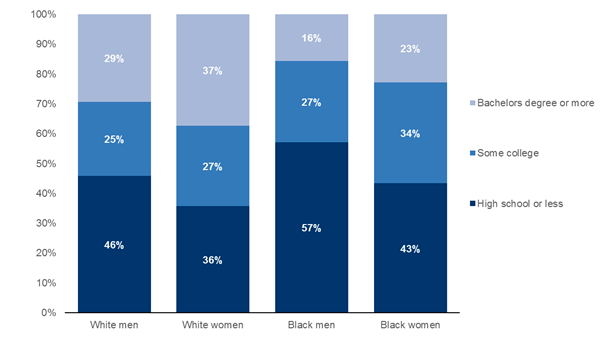http://www.theatlantic.com/business...er-a-tougher-prospect-for-black-women/391586/
Marrying Your Peer, a Tougher Prospect for Black Women
And more than ever, people of higher educational and income attainment are choosing to marry each other, instead of selecting mates from different educational backgrounds. In 1970, only 37 percent of college-educated men had a spouse with a similar level of education. In 2007 that figure was more than 70 percent, according to data from Pew Research. These pairings differ widely by race, with black Americans less likely to marry overall, and college-educated black women less likely than other groups to marry a man with a similar level of education.
Educational Attainment by Race, Gender

Brookings Institution
The decision to marry someone of a similar educational status is called assortative mating, and for black Americans—particularly black women—the ability to participate in such forms of marital selection are slimmer than they are for women of other races. For one, black women are much more likely than their male counterparts to obtain college degrees. They're also less likely to marry outside of their race, which can leave them with fewer choices when it comes to matching up with someone of a similar educational status. And that can have a ripple effect that impacts not only current earnings, but future economic mobility.
According to a recent memo from Brookings Institution, when looking at married women ages 25 to 35, about 41 percent of white women had husbands who had similar educational-attainment levels, while only 32 percent of married black women could say the same. About 48 percent of white women reported having husbands with lower levels of educational attainment, while nearly 60 percent of black women had married someone with less education under their belt. That discrepancy could result in a household that earns about $25,000 less each year, according to Brookings.
Marrying Your Peer, a Tougher Prospect for Black Women
And more than ever, people of higher educational and income attainment are choosing to marry each other, instead of selecting mates from different educational backgrounds. In 1970, only 37 percent of college-educated men had a spouse with a similar level of education. In 2007 that figure was more than 70 percent, according to data from Pew Research. These pairings differ widely by race, with black Americans less likely to marry overall, and college-educated black women less likely than other groups to marry a man with a similar level of education.
Educational Attainment by Race, Gender

Brookings Institution
The decision to marry someone of a similar educational status is called assortative mating, and for black Americans—particularly black women—the ability to participate in such forms of marital selection are slimmer than they are for women of other races. For one, black women are much more likely than their male counterparts to obtain college degrees. They're also less likely to marry outside of their race, which can leave them with fewer choices when it comes to matching up with someone of a similar educational status. And that can have a ripple effect that impacts not only current earnings, but future economic mobility.
According to a recent memo from Brookings Institution, when looking at married women ages 25 to 35, about 41 percent of white women had husbands who had similar educational-attainment levels, while only 32 percent of married black women could say the same. About 48 percent of white women reported having husbands with lower levels of educational attainment, while nearly 60 percent of black women had married someone with less education under their belt. That discrepancy could result in a household that earns about $25,000 less each year, according to Brookings.

 doesn't look like propaganda to me. Yes there is multiple reasons behind why black men aren't as educated, but the numbers do not lie.
doesn't look like propaganda to me. Yes there is multiple reasons behind why black men aren't as educated, but the numbers do not lie.

